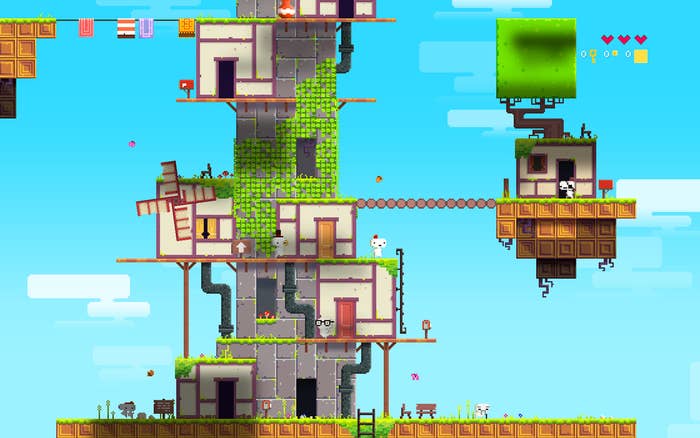
Phil Fish is a very smart, very disputatious Canadian independent game developer. He's known best for three things: his masterful 2012 game Fez; his prominent role in documentary Indie Game: the Movie (2012) that chronicled the agonies and joys of independent game development; and his curt dismissal of modern Japanese games ("your games suck") on a panel at the 2012 Game Developer's Conference, a truthy assertion that cemented Fish as a go-to for good quotes. Along with Jonathan Blow, the developer of Braid, Fish is the face of a certain kind of indie gaming: thoughtful, arrogant, funny, undiplomatic.
On Saturday, Fish publicly quit game development. After announcing the cancellation of a sequel to Fez, Fish wrote the following on the website of Polytron, his company:
FEZ II is cancelled.
i am done.
i take the money and i run.
this is as much as i can stomach.
this is isn't the result of any one thing, but the end of a long, bloody campaign.
you win.
Despite Fish's statement that no one thing led to his "retirement," the immediate impetus behind his decision was clearly an episode of Invisible Walls, a web series on the enthusiast site Gametrailers.com, on which a gaming personality named The Annoyed Gamer (real name: Marcus Beer) called him a "hipster" and a "tosspot." Fish, in his style, got in an angry Twitter confrontation with Beer, and made his announcement soon after. Though Beer's criticism of Fish was an incredibly minor point in the grand scheme of game news (Beer took issue with the fact that Fish refused to publicly comment on the announcement that Xbox One would allow indie developers to self-publish), some in the gaming press have turned this into a referendum on the nature of game discourse on the internet. In this telling, Fish is the hotheaded but brilliant victim of internet bullies, a martyr pushed out of gaming by sheer vitriol (sample headline: "Phil Fish and the hate mob: an internet tragedy").

What? Within the very narrow spectrum of indie games, in which many developers engage with their fans and detractors on Twitter, this analysis makes a certain sense. Within the broader American artistic culture, this argument is actually absurd. In any other major artistic discipline, the amount of vitriol reserved for creators who are perceived by fanboys and girls as avant-garde dilettantes makes Beer's comments about Fish seem basically innocuous. In fact, what often makes these artists important is the mere fact that genre- or culture-guardian types reflexively detest them. A few examples:
• The acclaimed Brooklyn black metal Liturgy has been absolutely pilloried for the perceived pretension and pseudo-intellectualism of their singer, Hunter Hunt-Hendrix. In one of the more restrained criticisms of the band, the metal writer Chris Crigg called Hendrix "ugly, selfish, and immature," "arrogant, condescending, and bursting with pretension." Less circumspect critics have suggested that Liturgy "get fucked in the ass–to death."
• The buzzy hipster novelist Tao Lin has been mocked for a smorgasbord of writerly sins. A widely shared — ambivalent! — review of his new novel Taipei begins, "When I began to read Taipei on my morning commute, I wondered if I had been lobotomized in the night. On the way back home, I wondered why someone who hates words would take the trouble to arrange so many of them in a row." A review of his previous novel in The New York Times ended, "By the time I reached the last 50 pages, each time the characters said they wanted to kill themselves, I knew exactly how they felt."
• The indie filmmaker Noah Baumbach has actually had a career-long nemesis in the form of movie critic Armond White, who once wrote that one of Baumbach's films was so bad as to suggest a retroactive abortion. I'm serious! And White is the three-time chairman of the New York Film Critics Circle!
I could go on and on, but the thing that Liturgy, Lin, and Baumbach all have in common is that they are still making art, despite withering artistic and sometimes ad hominem criticism. Now think back to Fish and Beer. Beer isn't a respected critic or big name. He's a middle-aged man with a chinstrap who calls himself "The Annoyed Gamer." And he wasn't even criticizing Fish's art, merely his media presentation.
There's a few points to be made here. First, the idea of game makers as artists is still a developing one. Game makers who want to be taken seriously don't need to be Joycean elitists, wryly paring their fingernails, but they also need to have enough self-confidence not to engage with every blowhard with a camera. It diminishes them. Phil Fish made one of the best games of the past few years; he should be laughing at Marcus Beer. The second point, made sensibly and well by Chris Plante at Polygon, is that someone on the internet will always find fault with something that you do. How many times have you read an interview with an artist who claims not to read their reviews? There's a reason for that.
I'm not advocating that game creators detach from the conversation; that's probably impossible, not least since they have a unique technological sophistication among artists. But there will always be a disconnect between artists, their art, and the public perception of each. And I hope that game developers with artistic aspirations, especially ones as talented Phil Fish, can learn to accept the fact that making the peanut gallery uneasy and angry is often a sign of doing the right thing.
